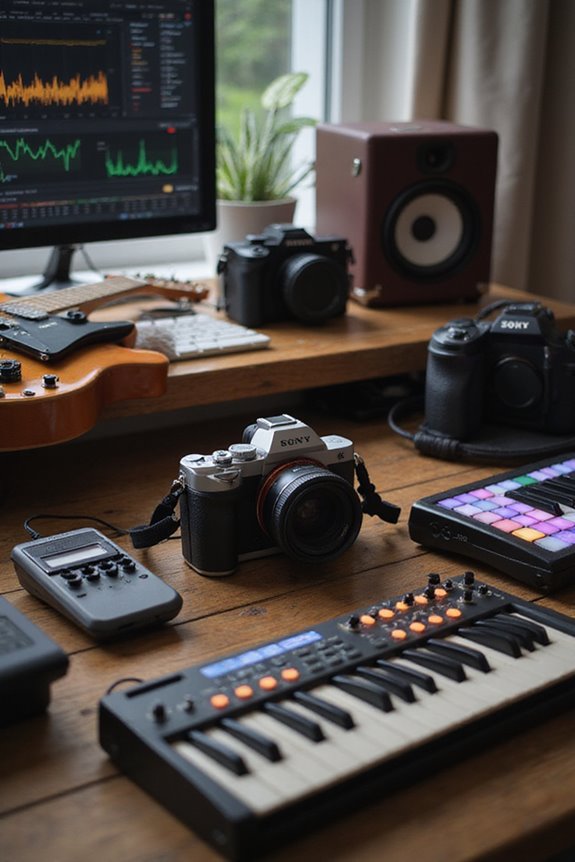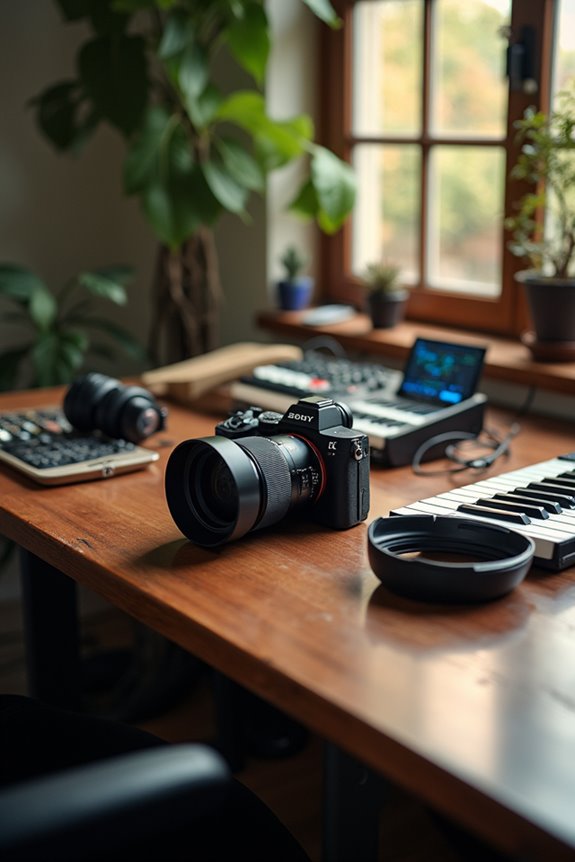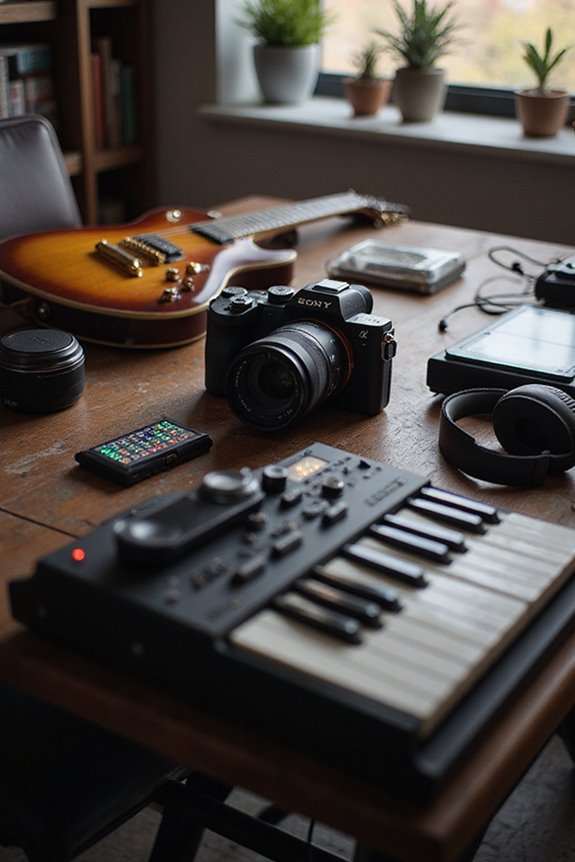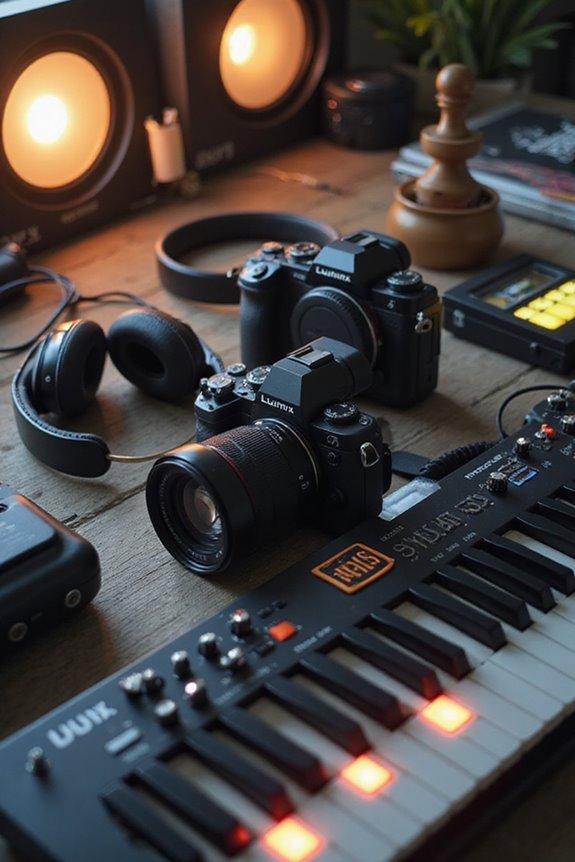As an Amazon Associate, we earn from qualifying purchases. Some links may be affiliate links at no extra cost to you. Although our opinions are based on curated research, we haven't used these products. Articles generated with AI.
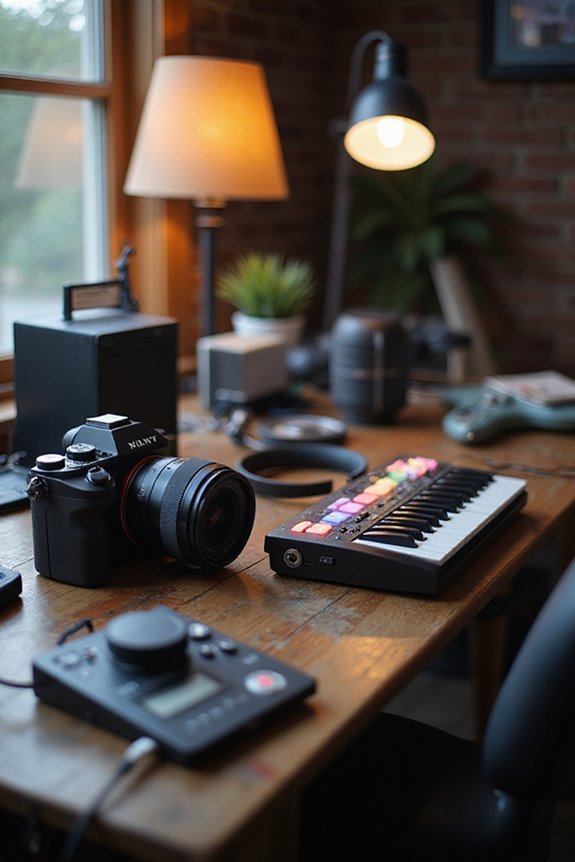
5 Best MIDI Piano Sound Modules of 2025 – Unleash Your Creativity
Looking for the best MIDI piano sound modules of 2025? You can’t go wrong with the Akai Professional MPK Mini MK3, known for its portability and 25 responsive keys. The MPK Mini Play MK3 offers built-in sounds and a speaker, perfect for mobile musicians. For more versatility, try the MPK Mini Plus with its RGB pads. If you’re seeking a compact solution, the PianoBox Mini or DaierTek’s Bluetooth keyboard can jumpstart your creativity. Want to know more about these options?
Key Takeaways
- Akai Professional MPK Mini Play MK3 is ideal for traveling musicians, offering built-in sounds and lightweight portability for spontaneous creativity.
- PianoBox Mini provides direct USB connectivity, featuring 128 General MIDI sounds perfect for diverse musical exploration.
- DaierTek Midi Keyboard Controller offers wireless connectivity with a long battery life, allowing for freedom during performances and creative sessions.
- Akai Professional MPK Mini MK3 has beginner-friendly software, making it an accessible choice for those just starting their music creation journey.
- Akai Professional MPK Mini Plus combines portability with advanced features, supporting both novice and experienced players looking for dynamic performance options.
Akai Professional MPK Mini MK3 – 25 Key USB MIDI Keyboard Controller
Akai Professional MPK Mini MK3 25 Key USB MIDI Keyboard Controller With 8 Backlit Drum Pads, 8...
- Music Production and Beat Maker Essential -USB powered MIDI controller with 25 mini MIDI keyboard velocity-sensitive keys for studio production, virtual synthesizer...
- Total Control of your Production - Innovative 4-way thumbstick for dynamic pitch and modulation control, plus a built-in arpeggiator with adjustable resolution, range and...
- Native Kontrol Standard (NKS) Integration - Akai Professional and Native Instruments have partnered to bring NKS support to the MPK Controller series, get ready to...
If you’re an aspiring music producer or a beginner looking to immerse yourself in the world of digital music creation, the Akai Professional MPK Mini MK3 is an outstanding choice. This 25-key USB MIDI keyboard controller is compact and perfect for travel, featuring eight backlit drum pads and eight assignable knobs. You’ll appreciate the velocity-sensitive keys and the integrated arpeggiator, which make composing and sound manipulation easy. The included MPC Beats software gets you started quickly, while the 4-way thumbstick simplifies pitch and modulation control. Overall, the MPK Mini MK3 combines portability and functionality for any music production setup.
Best For: Aspiring music producers and beginners seeking a portable and user-friendly MIDI keyboard for music creation.
Pros:
- Compact and lightweight design makes it ideal for travel and mobile music production.
- Velocity-sensitive pads and keys provide a responsive experience for drumming and synth control.
- Includes software and virtual instruments that help beginners start making music right away.
Cons:
- Setup process can be complex and may require external power for certain tablets.
- Learning curve with customization of pads and sound mapping might be challenging for some users.
- Limited free plugins and sound packs, which can lead to additional costs.
Akai Professional MPK Mini Play MK3 MIDI Keyboard Controller
Akai Professional MPK Mini Play MK3 - MIDI Keyboard Controller with Built-in Speaker and Sounds Plus...
- Compact yet powerful standalone mini keyboard with built-in speaker and USB MIDI Controller capabilities for beat makers, songwriters and musicians
- 25-Key Gen 2 MPK Mini dynamic keybed, OLED Display, 8 Velocity sensitive backlit MPC drum pads, arpeggiator and note repeat, plus 4 encoder knobs deliver a professional,...
- Native Kontrol Standard (NKS) Integration - Akai Professional and Native Instruments have partnered to bring NKS support to the MPK Controller series, get ready to...
Designed with portability in mind, the Akai Professional MPK Mini Play MK3 MIDI Keyboard Controller stands out as an ideal choice for traveling musicians and aspiring producers. Weighing only 2 pounds and compact enough to fit in your backpack, it’s perfect for jamming on-the-go. With 25 dynamic keys and 8 velocity-sensitive drum pads, you’ll enjoy a responsive playing experience. Plus, its built-in speaker lets you create music anywhere, though consider connecting to external speakers for enhanced sound. You’ll also find over 100 internal sounds, making it a versatile tool for beginners and seasoned creators alike.
Best For: The Akai Professional MPK Mini Play MK3 is best for traveling musicians and aspiring producers seeking a portable and versatile MIDI keyboard.
Pros:
- Lightweight and compact design makes it easy to transport and perfect for on-the-go music creation.
- Versatile sound capabilities with over 100 internal sounds and the ability to connect to external speakers for enhanced audio.
- Beginner-friendly features including an easy learning curve and integrated software options help users get started quickly.
Cons:
- Internal speaker quality is limited, which may not suffice for all users without external amplification.
- 25-key layout may feel restrictive for those accustomed to full-sized keyboards.
- Mixed user feedback regarding the desired volume of the internal speakers and key sensitivity.
Akai Professional MPK Mini Plus USB MIDI Keyboard Controller
Akai Professional MPK Mini Plus - USB MIDI Keyboard Controller with 37 Mini Keys, 8 MPC Pads,...
- Full Creative Control - A dynamic 37-Key MPK Mini keybed for 3 full octaves of melodic and harmonic performance; Easily connect to your DAW or studio equipment with the...
- Advanced Connectivity - Connect to different sound sources with CV/Gate and MIDI I/O; Control modular gear, sound modules, synthesizers, and more to bring new sound...
- Native Kontrol Standard (NKS) Integration - Akai Professional and Native Instruments have partnered to bring NKS support to the MPK Controller series, get ready to...
For aspiring musicians and producers seeking a compact yet powerful MIDI controller, the Akai Professional MPK Mini Plus stands out with its versatile 37 mini keys and premium RGB MPC pads. The Gen 2 dynamic keybed expands your creative possibilities, letting you play two-handed chords and engaging solos effortlessly. The 8 RGB pads are responsive, allowing for dynamic performances with the added benefit of Chords and Scales modes.
Whether you’re controlling your DAW or connecting to external synths via MIDI, the MPK Mini Plus excels. With bundled software like MPC Beats, you can jumpstart your music production journey right away.
Best For: Aspiring musicians and producers seeking a compact, versatile MIDI controller for music production and live performance.
Pros:
- Compact and lightweight design makes it highly portable, perfect for on-the-go musicians.
- Versatile features including 37 mini keys, 8 RGB MPC pads, and a sequencer for enhanced creativity.
- Bundled software (MPC Beats) and sound libraries provide a comprehensive start for new users.
Cons:
- Requires a computer connection to operate, limiting standalone use.
- Some users may face a learning curve when exploring the full range of features.
- Difficulties may arise when connecting to hardware synthesizers via 5-DIN MIDI connectors without a computer host.
PianoBox Mini General MIDI Sound Module
PianoBox Mini General MIDI Sound Module
- The PianoBox Mini is a great way to add sound to your controller keyboard or eliminate latency when working with your computer. With a built in battery, the PianoBox Mini...
- Want to use your USB MIDI keyboard without turning on your computer? The PianoBox Mini is the solution.
- You can connect any USB MIDI keyboard directly to the PianoBox Mini - without the need for your computer! This unique feature allows you to connect the PianoBox Mini to...
Looking for a compact solution that delivers quality sound without the hassle of wires and setup? The PianoBox Mini General MIDI Sound Module makes it easy to elevate your music experience. This portable module connects directly to USB MIDI keyboards, enabling you to work seamlessly without a computer. It offers 128 General MIDI sounds and boasts a 64-note polyphony, ensuring your music is rich and layered. Plus, the rechargeable battery gives you up to five hours of active use. While it may lack some modern sound quality, it’s perfect for practice or quick sessions on the go.
Best For: Musicians seeking a portable and easy-to-use MIDI sound module for practice or quick sessions.
Pros:
- Portable design with a built-in rechargeable battery for use on the go.
- Direct connection to USB MIDI keyboards, eliminating the need for a computer setup.
- Offers 128 General MIDI sounds and a 64-note polyphony for versatile musical expression.
Cons:
- Sound quality is considered low compared to modern standards.
- Lacks realistic dynamics in sound reproduction.
- Requires external amplification for better volume output.
DaierTek Midi Keyboard Controller 25 Key Portable Mini Bluetooth & USB Midi Piano
DaierTek Midi Keyboard Controller 25 Key Portable Mini Bluetooth & USB Midi Piano with 8 Backlit...
- Multiple Function:The midi keyboard controller comes with 25 velocity sensitive keys, 8 RGB backlit pads with velocity sensitive & aftertouch, 8 assignable encoder,...
- Wireless and Portable: The mini midi keyboard can connect wirelessly to your device via Bluetooth, it has a built-in 2,000 mAh battery that lasts for about 16 hours of...
- Compatibility: This midi controller keyboard is compatible with Windows, Mac OS, Android and iOS, and compatible with most digital audio workstations which support ble...
The DaierTek Midi Keyboard Controller 25 Key stands out as a top choice for budding musicians and seasoned producers alike, thanks to its impressive array of user-friendly features. With 25 velocity-sensitive keys and 8 RGB backlit pads, you’ll find making music intuitive and enjoyable. The Bluetooth connectivity means you can easily jam wirelessly, while its 2,000 mAh battery lasts up to 16 hours, ensuring long play sessions.
Compatible with various DAWs like Ableton and GarageBand, this portable midi piano enhances your workflow. Whether you’re composing or performing, the smart chord and scale functions simplify your creative process.
Best For: The DaierTek Midi Keyboard Controller 25 Key is best for beginner musicians and experienced producers looking for a portable and versatile MIDI controller.
Pros:
- Compact and lightweight design makes it easy to carry and set up anywhere.
- Wireless connectivity via Bluetooth allows for mobility without the hassle of cables.
- User-friendly features like smart chord and scale functions aid in music creation for beginners.
Cons:
- Limited number of keys (25) may not be sufficient for advanced compositions.
- Learning curve may still exist for absolute beginners despite user-friendly features.
- Battery life may vary based on usage and connectivity, potentially affecting longer sessions.
Factors to Consider When Choosing a Midi Piano Sound Module
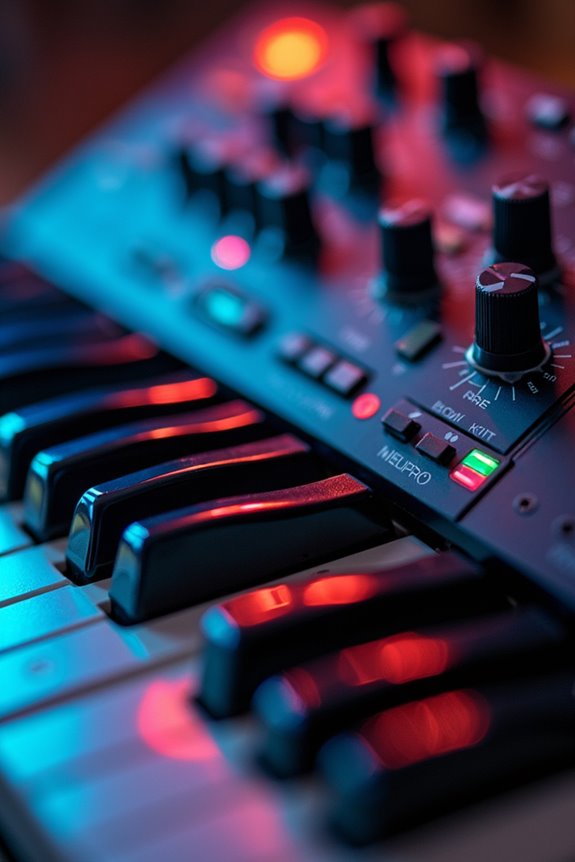
When you’re choosing a MIDI piano sound module, several key factors can impact your decision. You’ll want to evaluate sound quality, connectivity options, and portability, ensuring it fits your setup and needs. Plus, compatibility with your software and an intuitive user interface can make a big difference in your overall experience.
Sound Quality Considerations
Choosing the right MIDI piano sound module hinges on several key sound quality considerations that can dramatically affect your music production experience. First, check the polyphony; a 64-note polyphony allows for more simultaneous sounds, preventing notes from cutting off. Next, consider the bit depth and sample rate—16-bit at 48kHz can enhance clarity and richness. You’ll also want to guarantee General MIDI compliance, which guarantees compatibility with a standard set of sounds. Dynamic range and digital filtering capabilities play essential roles too; better filtering results in more nuanced audio output. Finally, user feedback highlights that sound quality is critical in professional settings, affecting both performance and usability. Make these considerations a priority for your creative journey.
Connectivity Options Available
As you explore your options for MIDI piano sound modules, connectivity should heavily influence your decision, especially considering the enhanced flexibility it provides. Look for USB MIDI keyboard connections, allowing direct integration with MIDI devices without needing a computer. This feature enhances portability and ease of use. Consider MIDI input options to connect other MIDI gear, expanding your sound sources and control. Guarantee compatibility with USB MIDI interfaces to minimize latency when using software, ultimately improving your music performance. Wireless features like Bluetooth offer freedom of movement and reduce cable clutter during performances. Finally, evaluate MIDI I/O ports for connections to modular gear and synthesizers, making your setup more versatile and dynamic.
Portability and Weight
Finding the right MIDI piano sound module can greatly enhance your music experience, particularly when it comes to portability and weight.
Opt for a compact, lightweight design to make transportation effortless for gigs or travel. Look for models with built-in rechargeable batteries, as this feature allows you to play without being tethered to an outlet. Additionally, consider sound modules that connect directly to USB MIDI keyboards; this enhances convenience in various locations.
A module that fits snugly into a backpack or small case is ideal for musicians on the move. Finally, pay attention to battery life; selecting a module with extended usage permits longer playing sessions when away from power, ensuring your creativity flows uninterrupted.
Compatibility With Software
Selecting a MIDI piano sound module that integrates seamlessly with your software setup can greatly enhance your production workflow. Start by ensuring it supports USB MIDI connections, which makes it easy to connect with various digital audio workstations (DAWs) and MIDI keyboards. Check compatibility with popular operating systems like Windows, Mac OS, Android, and iOS for broad usability. Look for General MIDI (GM) compliance; it standardizes sounds across different software applications. Consider modules offering MIDI input options, allowing you to connect additional MIDI devices for versatility. Finally, investigate specific software integration features, such as Native Kontrol Standard (NKS), which simplifies controlling sound libraries and presets, making your creative process more efficient.
User Interface Design
When you’re choosing a MIDI piano sound module, the design of its user interface can greatly impact your playing experience and workflow. A user-friendly interface guarantees quick access to essential functions like volume control and sound selection, enhancing your creativity. Look for display screens that show current program information and volume levels, which provide crucial feedback.
An intuitive layout of knobs and buttons simplifies navigation, allowing you to adjust parameters on-the-fly during performances. Opt for large, responsive knobs that make controlling sound parameters smoother and faster. Additionally, a well-designed interface minimizes latency, making sure your input translates seamlessly into sound. Prioritize these features for an optimized and engaging playing experience. You’ll find the right module can elevate your music-making to new heights.
Power Supply Options
Your choice of power supply can greatly influence the functionality and portability of a MIDI piano sound module. You might choose models with built-in rechargeable batteries, providing convenience for music production on-the-go without worrying about external outlets. If your module requires USB power, it may simplify your setup, but keep in mind this can limit your mobility to places with accessible USB ports. Also, consider battery life—some portable units offer several hours of use per charge. Importantly, check the current draw; some sound modules need more power than USB ports can supply, so having an external power adapter may be essential for peak performance. Choose wisely to enhance your creative freedom!
Frequently Asked Questions
What Are the Best Sound Libraries for MIDI Sound Modules?
Choosing the best sound libraries for MIDI sound modules is like selecting fine ingredients for a gourmet dish. You’ll want libraries that boast high-quality samples, such as Spitfire Audio’s BBC Symphony Orchestra or Native Instruments’ Kontakt offerings. These collections not only provide realistic sounds but also allow you to create complex compositions. Their user-friendly interfaces make experimentation easy, helping you release your creativity while keeping the workflow smooth and efficient.
Can I Use MIDI Sound Modules With Mobile Devices?
Absolutely, you can use MIDI sound modules with mobile devices! Many modern modules support Bluetooth or USB connections, allowing seamless integration. For instance, if you’ve got a MIDI keyboard or controller, you can connect it to a tablet using a USB adapter. This lets you access apps like GarageBand or FL Studio for music creation on the go. Just verify your mobile device has the right compatibility for a smooth experience.
How Do I Optimize My Studio for MIDI Sound Modules?
To get the most out of your MIDI sound modules, start by guaranteeing your DAW is updated and compatible. Use high-quality audio interfaces to minimize latency, providing clearer sound. Organize your cables to reduce clutter and optimize signal flow. You might consider adding acoustic treatment to improve the room’s sound. Finally, regularly update your MIDI device firmware to guarantee you’ve access to the latest features and enhancements.
Are There MIDI Sound Modules Suitable for Live Performances?
Absolutely, MIDI sound modules can revolutionize your live performances! Look for models like the Roland Integra-7 or the Nord Stage 3, known for their reliability and exceptional sound quality. These modules offer a wide range of sounds and easy integration with your other gear. You’ll appreciate features like real-time control for dynamic performances. Plus, their portable designs won’t weigh you down during gigs, making them perfect for any music venue!
How Do MIDI Sound Modules Connect to DAWS?
To connect MIDI sound modules to your digital audio workstation (DAW), use a USB or MIDI cable. If you’re using USB, plug it into your computer and select the device in your DAW’s preferences. For MIDI cables, connect the module’s MIDI OUT to your audio interface’s MIDI IN. This setup lets you trigger sounds from the sound module while recording and mixing directly within your DAW. Enjoy creating!






